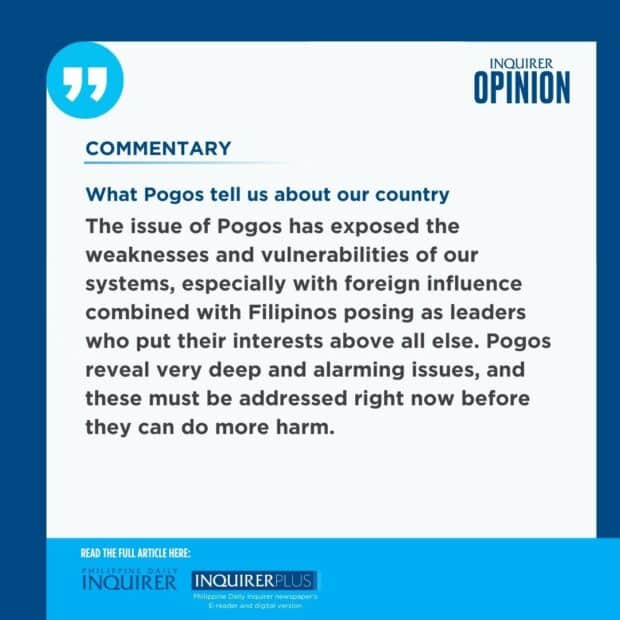What Pogos tell us about our country

The individual words in the acronym Pogo—“Philippine,” “offshore,” “gaming,” and “operators”—by themselves are neutral and do not mean anything offensive or illegal. Taken together, however, Pogo evokes the concepts of foreign syndicates, human trafficking, workplaces with oppressive conditions, money laundering, illegal immigration, and the complicity of some Filipino politicians.
Pogos are a national menace on so many fronts. One can look at it from a governance and transparency point of view, human rights, economics, and national security. Indeed, the Pogo phenomenon which first rose during the previous administration, in the guise of stimulating economic activity, has done us great harm and no good.
Alice Guo, who has been unmasked as Chinese national Guo Hua Ping, has become the personification of the failures of governance that made the rise of Pogos possible in our country.
The proximity of Pogos to military bases and reports of alleged People’s Liberation Army uniforms in Pogo compounds raise concerns about espionage, amplifying fears of national security breaches that could compromise the country’s defense capabilities. This presents a grave threat to peace and order as well as the national security of the Philippines.
And if we think that the rift between the Philippines and China is only taking place in the West Philippine Sea, we would be wrong. It also shows in the shaping of public opinion through China’s malign influence operations. These actions aim to manipulate how people think, weaken democratic institutions, and challenge the country’s sovereignty, creating a serious threat to the Philippines’ stability.
The move to ban Pogos is a crucial step toward helping the Philippines exit the Financial Action Task Force’s grey list. Earlier this year, President Marcos instructed relevant government agencies to address the country’s “grey listing.” The government has set a deadline to exit the grey list by the start of 2024 after missing the original target of January 2023.
In the legislature, Sen. Risa Hontiveros, in her published statement during the Senate investigation on online gaming industries, revealed that aside from crimes committed in the country, Pogos might have been used by China for propaganda and “espionage” operations in the Philippines.
Sen. Win Gatchalian said the Pogo industry “has turned the country into a haven for human trafficking, scamming, kidnapping, and other criminalities that have adversely affected many of our people.”
Widely lauded was the signing of Executive Order No. 74 on Nov. 5, 2024, signaling a key milestone in the effort to eradicate Pogos.
There are also moves to hold Philippine officials, who were found to have encouraged and even benefited from Pogos, accountable for their actions.
But what can the Filipino people do about Pogos, especially now that the 2025 elections are approaching?
According to a Pulse Asia Survey in September 2024, 99 percent of Filipinos do not trust China. According to the poll, the United States remains the most trusted partner of Filipinos for national development at 79 percent followed by Japan (50 percent), Canada (43 percent), and Australia (42 percent).
It follows that the rejection of pro-China candidates in the May 2025 midterm elections is at 73 percent. Only 5 percent of Filipinos say they “will support” a pro-China candidate, while 23 percent are ambivalent.
Meanwhile, a Social Weather Stations (SWS) survey conducted in the same month revealed that fighting corruption, job creation, livelihood generation, and financial literacy are the key components that should be central to a senatorial platform in the 2025 elections.
The SWS survey also found that nine out of 10 Filipinos (91 percent) agreed that “government officials involved in corruption must be held accountable.”
The issue of Pogos has exposed the weaknesses and vulnerabilities of our systems, especially with foreign influence combined with Filipinos posing as leaders who put their interests above all else. Pogos reveal very deep and alarming issues, and these must be addressed right now before they can do more harm.
Elections are a time for people to be heard. Our people deserve leaders who will put our nation’s interests above all else. Anything less merits their rejection.
—————-
Dindo Manhit is the founder and CEO of Stratbase Group.




















